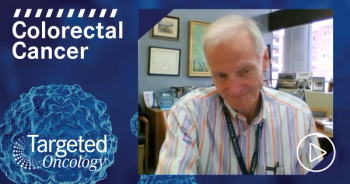
Follow-Up After Adjuvant Therapy for Colorectal Cancer
Michael A. Morse, MD:How to follow patients who have had surgery and now systemic chemotherapy has certainly been evolving over the years, and it depends a lot on patients’ desire for aggressiveness of follow-up. However, there are standard guidelinesfor example, every-3-month visits with the oncologist and checking a CEA level at that point, imaging studies initially every 3 to 6 months, and then after 2 years or more, expanding the time interval between those imaging studies out to 5 years.
Typically, we will perform a colonoscopy 1 year after diagnosis, except in a patient who never had a complete colonoscopy at the time of their initial presentation. For them, we’ll typically want to perform that colonoscopy within the first few months to 6 months after surgery. Based on what is found in that 1-year colonoscopy, we’ll generally discuss with a gastroenterologist what type of follow-up to have, but often, it’s a 3- to 5-year follow-up on the next colonoscopy.
In a patient who has had surgery and now had systemic chemotherapy, the follow-up for that patient needs to be dictated by several factors. One is certainly their risk of recurrence but also patient wishes and comorbidities. It’s also, of course, critical to consider patient wishes about how aggressively they would like to be followed. Now for the highest risk of recurrenceor certainly in the first 2 to, say, 3 or 4 years—the intensity of follow-up should be guided by exactly what point the patient is at since their surgery. NCCN and ASCO have slight differences in their follow-up recommendations, but in general, it’s recommended that in the first at least 2 years, there be visits with the oncologist about every 3 months or so. Imaging could be performed every 6 to 12 months, depending on the guideline that you look at and, again, the perceived risk of recurrence and patient wishes.
The other things that we discuss with people are the critical survivorship issues. Everybody should have some type of survivorship plan that includes issues like follow-up. It also includes considerations of management of toxicity that they may continue to have, such as neuropathy. It’s also a consideration of whether there are other measures they can take to reduce their risk of recurrence. Of course, we know that exercise is associated with a lower risk of recurrence, so we want to make sure that people have some type of exercise planned that at least fits their physical abilities. And also, making sure that dietary measures are brought into play. It’s really important that people maintain a very healthy lifestyle and eating habitsreduction of red meat and an increase in fruits and vegetables.
Some people have also asked about adjunctive measures such as aspirin. And that’s an important issue because there does seem to be a reduction of risk of recurrence of colon cancer in people who have had aspirin therapy. However, it’s certainly an evolving field as to which patients truly benefit from aspirin. And, of course, aspirin is not for everybody, as there can be an increased risk of GI bleeding or bleeding elsewhere. So, we certainly ask people to discuss with their internist whether aspirin is also appropriate for them for other reasons.
This is, of course, a very exciting time in the development of strategies to treat advanced colon cancer and, indeed, for localized adjuvant therapy as well. We’re getting a better molecular understanding of tumors. While we, of course, have been focusing onRAS,BRAF, and MSI status, there’s, of course, a wealth of information about molecular status in the tumor that can be obtained by next-generation sequencing.
Certainly, in patients with refractory disease, we’ve been increasingly using next-generation sequencing to look for targets where patients can either participate in clinical trials or, in some instances, may be able to have off-label use of drugs that fit those particular targets. Of course, the other exciting modality across many malignancies is immunotherapy. Now, so far, immunotherapy has had a clear effect in patients with microsatellite instability-high colon cancer, and we’re still looking to find out how best to use it in patients with microsatellite stable colon cancer.
However, there are numerous clinical trials now exploring checkpoint blockade plus other therapies in microsatellite stable colon cancer. So, we certainly encourage participation in clinical trials to try to answer questions about targeted therapy in patients with specific mutations or other molecular abnormalities. For patients with refractory disease, we encourage consideration of clinical trials. If patients have targetable mutations, we definitely steer them toward the appropriate basket trialfor example, the NCI-MATCH trial. And for other patients, if there’s an immunotherapy trial that they may be a candidate for, we certainly encourage their participation. For people with MSI-high colon cancers, there are high-profile clinical trials in the first line and later lines, that if you identify a patient who has microsatellite instability-high colon cancers, I would strongly consider those clinical trials for them.
Transcript edited for clarity.
- A 55-year old Caucasian male was admitted to the hospital with severe crampy right lower quadrant pain
- He had a 2-month history of constipation, general abdominal discomfort, and tiredness
- PMH remarkable for hyperlipidemia managed with diet and statin therapy
- Laboratory findings remarkable for grade 2 anemia (Hb, 9.0 g/dL) and elevated CEA (6.7 ng/mL)
- CT showed a non-obstructive mass in the sigmoid colon that infiltrated the full thickness of the bowel wall and involved adipose tissue
- Biopsy results indicated poorly differentiated invasive adenocarcinoma
- He opted for sigmoid colectomy and was referred to a surgeon
- Following surgery, R0 resection with clear margins
- 9 of 13 lymph nodes sampled were positive for adenocarcinoma










































